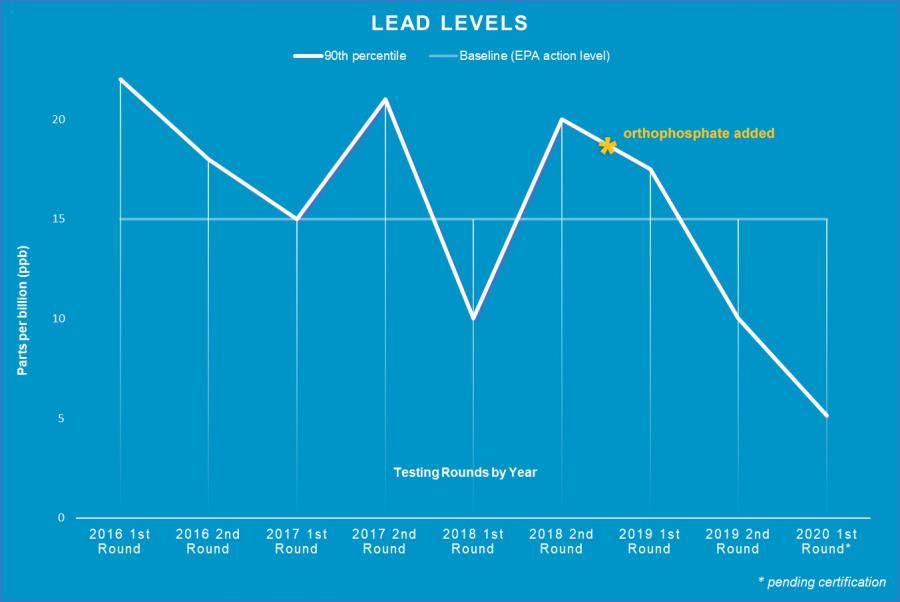Pittsburgh, PA — The Pittsburgh Water and Sewer Authority (PWSA) is proud to announce that its existing Community Lead Response, a multi-faceted approach to remove lead from Pittsburgh’s water distribution system, already meets many of the standards found in the recently upgraded Lead and Copper Rule (LCR). On December 22nd, 2020, the Environmental Protection Agency (EPA) announced updates to the LCR, a 30-year-old federal regulation that protects communities across the United States from the risks of lead exposure.
PWSA joined other cities with aging lead infrastructure to share their hands-on experience of reducing lead levels in water and replacing lead service lines with the EPA. Since testing over the federal “action limit” in 2016, PWSA’s Community Lead Response team has worked continuously to provide easy-to-understand information about lead in water, provides free lead test kits and water pitcher filters for those with high lead levels and has implemented several multi-million-dollar construction programs to replace lead service lines with a non-lead material.
Changes to water testing
Some of the updates to the LCR include more accurate testing parameters for lead in tap water. New regulations require testers to sample the fifth bottle of water taken from the tap. Drawing multiple bottles ensures that the last bottle of water has sufficient contact time with the lead service line. PWSA already tests many homes across the distribution system using the EPA's present method to monitor lead and will continue its testing with the revised method.
Water providers are also required to test only homes with confirmed lead service lines when collecting samples for compliance testing. This can be done through historical records or physical inspection. Previously, residents could self-assess their service line and plumbing materials. PWSA’s present program tests homes with confirmed lead service lines, using curb box inspections and other historical data to make the confirmation.
There are new, stricter regulations for water systems that reach 10 ppb in their compliance sampling submitted to regulators. This will require systems to begin lead remediation efforts before they reach the EPA action limit of 15 ppb.
 With the addition of orthophosphate, an effective method of corrosion control, lead levels experienced a steep decline and are well below the federal action level of 15 parts per billion (ppb).
With the addition of orthophosphate, an effective method of corrosion control, lead levels experienced a steep decline and are well below the federal action level of 15 parts per billion (ppb).
Through extensive scientific and engineering efforts over the past four years, PWSA has shown the lowest lead levels in the distribution system in twenty years, ensuring it is well within federal compliance. Reducing lead levels for all Pittsburgh residents protects public health and ensures the safety of our drinking water.
Providers must also notify customers with elevated tap water samples and provide options for reducing lead. PWSA has already set this standard for itself, reaching out directly to customers with elevated lead levels to determine the source of lead in the home, and providing tips for reducing lead levels like flushing, filters, or lead service line replacement through one of our programs.
Water providers will also begin working with schools and childcare facilities to test for lead in buildings that serve children. This is a new requirement of the LCR and PWSA will begin working with these institutions across Pittsburgh to test water and identify lead risks.
Removing lead service lines
The updated LCR includes a ban on partial lead service line replacements. Removing only a portion of a lead service line can disrupt the pipe and cause dangerous spikes in lead. Additionally, partial replacements leave behind a portion of the lead line which will continue to pose a risk to the residents.
PWSA’s lead service line replacement program engages the property owner when a lead service line is found to coordinate the replacement and fully remove the risk at no cost to the customer. In Pennsylvania, private service line replacement by PWSA was made possible by a change to state legislation that would allow public authorities, like PWSA, to use ratepayer dollars to complete this important work on private property. Reversely, when a customer approaches PWSA ready to replace their private lead service line on their own, PWSA will coordinate to replace the public lead service line at the same time.
Water providers are now required to keep a public inventory of lead service lines. They now must notify homeowners when lead is present and share options for reducing lead. PWSA’s lead service line inventory has been publicly available since 2018, at www.pgh2o.com/leadmap. This map gives residents the tools to make decisions about their tap water. PWSA will adhere to the LCR revisions and begin to notify customers annually of their options if they have a lead service line.
Continuing our efforts
To date, PWSA has replaced over 8,100 public service lines and is working towards its goal of removing all lead from the distribution system by 2026. Since its regulatory lead exceedance in 2016, PWSA has worked hard to invest money in removing the risk of lead from the system and regaining the trust of its customers.
“Many of the revisions that were proposed in the draft are already standard practice,” said PWSA Chief Executive Officer, Will Pickering. “Some of our procedures even exceed the standards set by our federal regulators. We are proud of our program and will begin implementing what is required of us in this LCR update,” he said.
- For more information on PWSA’s Community Lead Response, including press releases, a lead inventory map, and free lead test kits for your home, visit www.lead.pgh2o.com.
- For more information on the Lead and Copper Rule Updates release by the Environmental Protection Agency, visit the EPA’s website.


